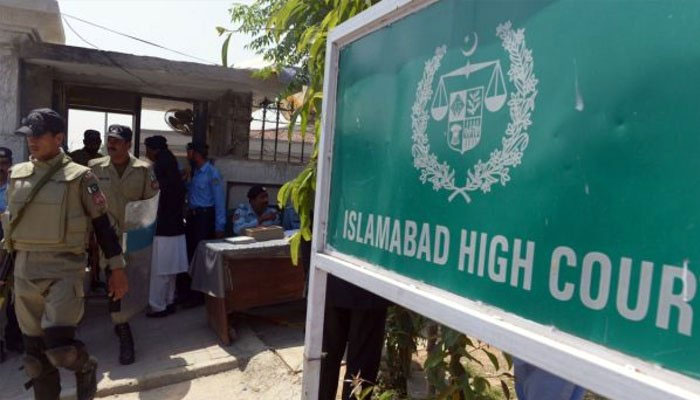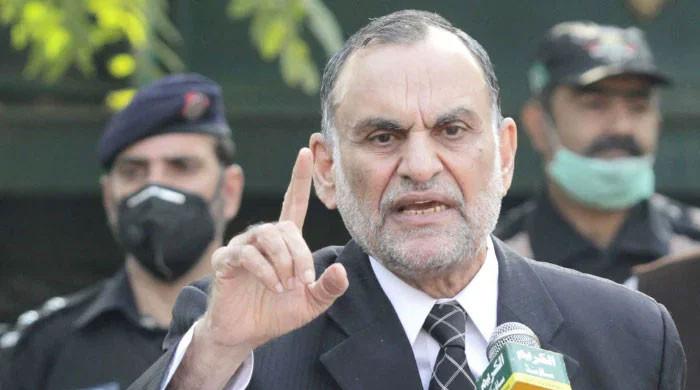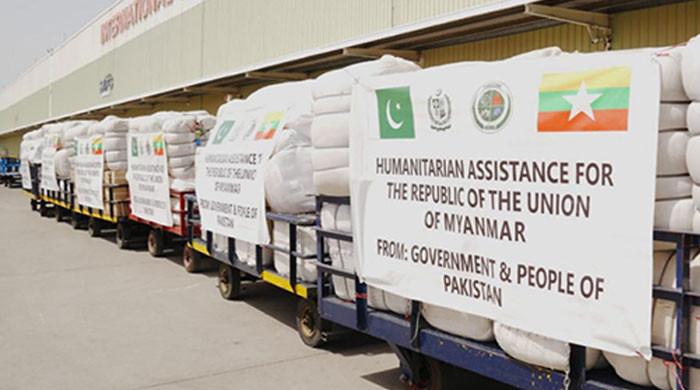PM’s special assistants cannot be disqualified over dual nationalities, rules IHC
Islamabad High Court says special assistants cannot be doubted based on the fact they hold dual citizenship
July 30, 2020

ISLAMABAD: The Islamabad High Court (IHC) on Thursday set aside a petition seeking removal of all of Prime Minister Imran Khan's aides with dual nationalities.
In the case pertaining to dual citizenship of the special assistants to the prime minister, the IHC remarked in a written judgement that the premier was accountable to the people and could not run the state affairs alone.
"The Federal Government has made the Rules of 1973 and has described the 'Organization of Divisions' in rule 4 ibid. Sub rule 6 of rule 4 enables the Prime Minister to appoint Special Assistant or Special Assistants and to determine their status and functions," IHC Chief Justice Athar Minallah wrote.
"The Rules of 1973, particularly rule 4(6) are not in conflict with the provisions of the Constitution. Special Assistants are not members of the Federal Cabinet. Moreover, they are distinct from Advisors appointed by the President on the advice of the Prime Minister under Article 93(1) of the Constitution.
"The Prime Minister is the chief executive of one of the most important organs of the State and has to perform multiple/complex functions. A person elected as Prime Minister is answerable to the people of Pakistan and the Majlis-e-Shoora (Parliament). The onerous role of the Prime Minister described under the Constitution cannot be performed by the latter alone," he added.
The IHC judge went on to say that neither the special assistants to the prime minister nor their patriotism could be doubted based on the fact that they held dual citizenship, the court ruled, and, thus, could not be disqualified either.
Their appointments were the premier's prerogative, it said, adding further that there was no restriction on the number of SAPMs the PM could appoint.
"In order to enable the Prime Minister to transact business of the Executive organ of the State, the latter ought to have the freedom to appoint officials or other persons for assistance. Rule 4(6) is one of such modes whereby the Prime Minister has been empowered to appoint Special Assistants. There is no restriction regarding the number of Special Assistants that can be appointed by the Prime Minister," he added.
"There is also no restriction of appointing persons having dual nationality. The only restriction provided in the Constitution is under Article 63(1)(c) and it is confined to disqualification of a person from 'being elected or chosen as, and from being, a member of the Majlis-e-Shoora (Parliament)'.
"This disqualification is also attracted in case of the membership of the Provincial Assembly. There are some statutes, which prescribe renunciation of nationality of another State as an eligibility condition for employment. There is no such restriction for appointment of a Special Assistant under rule 4(6) of the Rules of 1973.
The IHC also emphasised that doubts could not be cast on any person holding dual nationalities.
"It is not fair to raise doubts or to be skeptical regarding appointment of a dual national as a Special Assistant by the Prime Minister. The importance and contributions made by dual nationals cannot be denied. The patriotism of Pakistani citizens holding dual nationality cannot be doubted. The august Supreme Court has acknowledged the contributions of Overseas Pakistanis in numerous judgments [...].
"Patriotism of a person who is a citizen of Pakistan cannot be doubted nor suspected unless the State can demonstrably and without a shadow of doubt establish otherwise. A person who holds dual nationality is indeed a citizen of Pakistan and thus his or her commitment to Pakistan and patriotism cannot be doubted. A Pakistani citizen holding dual nationality is thus not ineligible or barred from being appointed by the Prime Minister as a Special Assistant under rule 4(6) of the Rules of 1973.
"Moreover, interference by this Court would adversely affect the transaction of business of the Federal Government and prevent the Prime Minister from discharging obligations under the Constitution thus warranting restraint," the judge noted.
SAPMs with dual nationalities
Penned by IHC Chief Justice Minallah, the decision had been reserved earlier today after the court heard the arguments in the case.
It had emerged last week that four special assistants to the prime minister held dual nationalities. These included Nadeem Babar (US), Syed Zulfiqar 'Zulfi' Abbas Bukhari (UK), Shahzad Qasim (US), and Tania S Aidrus (Canada and Singapore), the SAPMs on Petroleum, Overseas Pakistanis, Power Division, and Digital Pakistan, respectively.
The disclosure about the nationalities opened the floodgates with the opposition parties slamming the prime minister for inducting dual nationals in the cabinet.
'I always was and shall be a Pakistani'
However, Aidrus — an ex-Google executive — had resigned on Wednesday "in the greater public interest" after criticism for holding Canadian nationality.
"Criticism levied towards the state as a consequence of my citizenship status is clouding the purpose of Digital Pakistan. In the greater public interest, I have submitted my resignation from the SAPM role," she wrote on Twitter.
She added that she would "continue to serve my country and the PM’s vision to my best ability", noting that it was an "honour and privilege" to serve him.
"I returned to Pakistan with the singular intent to contribute and develop the vision of a Digital Pakistan, a concept which you have always voiced and I share.
"I always was and shall be a Pakistani,” she added.











